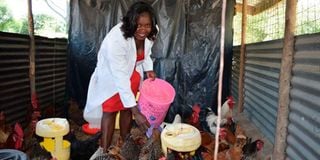GBV survivor finds solace in poultry farming

Lilian Ochola feeding her chickens at her poultry farm in Bonde village, Uyoma Siaya County.
What you need to know:
- When Covid-19 started ravaging the world, cases of GBV increased across the globe.
- Ms Ochola became a victim, forcing her to quit her marriage.
- She opted for poultry farming because it is something she can do from her parents’ home, a place where she says she feels safer, away from her husband.
In the remote village of Bonde, Uyoma in Siaya County, Lilian Ochola is making a fortune in poultry farming.
When Covid-19 started ravaging the world, cases of gender-based violence (GBV) increased across the globe. Ms Ochola became a victim, forcing her to quit her marriage.
All was, however, not lost; three months after going back to her parents’ home, the mother of five underwent a poultry farming training under a program called ‘Hatching Hope Kenya’, which gave her skills and urge to venture into the business.
“I parted ways with my husband in April 2020. I had to think about what to do while at my parents’ home,” Ms Ochola says.
She adds: “My late mother had earlier started a business for me and my husband made sure he destroyed everything; so when I came back home, I decided to venture into poultry farming.”
Poultry diseases
Banking on the skills she acquired from the two-month training, Ms Ochola invested Sh39,000, a support she got from her father to buy 100, two-month-old chicks in November last year.
“I was trained on how to manage poultry farms, poultry diseases and constructing poultry houses,” she says.
Ms Ochola is elated her poultry business is growing.
“I started in November 2020, with 100 chicks and now they are more than 200. I sold some matured cocks because they were outnumbering the hens,” she says.
She opted for poultry farming because it is something she can do from her parents’ home, a place where she says she feels safer, away from her husband.
She gets more than two crates of eggs, which she sells through Bora Cooperative at Sh600 per crate, every month. She ploughs back the money into the business.
“I have two crates of fertilised eyes daily and I sell them at Sh20 each; that is like Sh600 a crate…I get orders for such every day,” says Ms Ochola.
To overcome market challenges, she diversified through trading in day chicks, which she sells after 35 days. She also registered as a member of a cooperative, which connects her with clients.

Some of the hens at the poultry farm. Ms Ochola says she is happier doing this business after leaving an abusive marriage.
“The market is not bad, there is a cooperative society that provides a market for me. It cost me Sh350 to register there,” she says.
In a month, Ms Ochola makes more than Sh40,000 before deducting expenses for feeds, which she says is a bit expensive. She uses five 50kg bags of feeds, each costing Sh1,600, for matured chicken and another similar quantity costing Sh3,600 for layers’ mash, within the same period.
“I take home more than Sh15,000. In poultry farming, chicken feeds are the most expensive,” she says.
But all that glitters is not gold as Ms Ochola, who was a greenhorn in the business, says.
“I used to be a housewife because my husband never allowed me to do anything. After parting ways with him, I started this business, which has empowered me. I am now in a position to meet my daily needs,” she says.
Employ more
With her current 209 chicken, she is the only employee in the business but aims at having 1,000 chickens by November, giving her a chance to create employment for other people.
“I urge my fellow women who have tried marriages and failed not to give up because they can try poultry farming; it is easy and has a lot of profit,” she says.
One of the biggest challenges Ms Ochola experiences is poultry diseases and lack of market.
“It is not easy to deal with poultry in terms of diseases, a week does not pass without them getting sick. Again, despite selling my products through a WhatsApp platform of Bora Cooperative Society, it is sometimes not enough though it has helped me,” she discloses.





